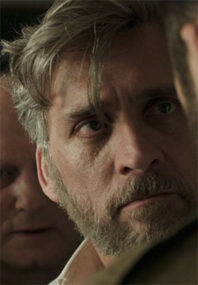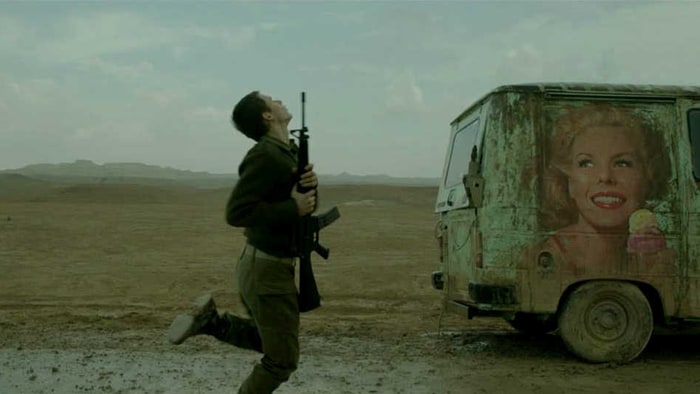
The foxtrot is a formal dance that takes you around in circles, always ending at the place where you began. Writer/director, Samuel Maoz, is a former Israeli soldier and sees the dance as an apt metaphor for his homeland’s incessant state of conflict and the cycle of loss, grief, and anger that arises from it. His riveting new film, Foxtrot, takes a granular look at the cost of war, telling one of the year’s most wrenching stories.
During Foxtrot’s sombre opening moments, the camera peers through the windshield of a vehicle as it drives across a barren landscape. It’s as if the film wants you to steady yourself before plunging into the emotional tempest lying in wait. A moment later the film cuts to a hallway and a knock at the door. Daphna Feldmann (Sarah Adler), wife and mother of two, sees a pair of soldiers standing at her door, collapses, and goes into a fit. We can piece the story together before anyone speaks a word. Daphna’s young son Jonathan (Yonathan Shiray), a soldier, was killed in the line of duty. The soldiers at the Feldmann’s door are there to break the news and walk the family through a step-by-step grieving process.
Jonathan‘s father Michael (Lior Ashkenazi) goes into a state of shock. For the first third of the film, events unfold from Michael’s perspective. He deals with Jonathan’s uncle who busies himself with funeral preparations, Daphna who the soldiers sedated, and his mother whose dementia prevents her from grasping what happened. As soon as we meet all the key players, the film drops a jaw-dropping twist on the Feldmann clan and then pivots to a new set of characters. The next act follows a squad of young soldiers stationed on an isolated outpost – we’re talking so out of the way that camels stroll by about as often as people. And it’s here where Foxtrot’s messages about violence, grief, and tragedy ring out loudest.
Last year, Lior Ashkenazi starred in a middle-of-the-road movie called Norman: The Moderate Rise and Tragic Fall of a New York Fixer. It was in Norman where his ebullient screen presence caught my attention. Ashkenazi turned in an effortless performance in an impossible role: A likeable politician. Ashkenazi has that intangible mix of charm, charisma, and striking looks that we call star power and in Foxtrot, he uses those qualities to full effect.
Michael Feldmann is a real piece of work. There is a popular screenwriting cliché called “Save the cat.” It states that to have your protagonist win the audience’s favour have them do something heroic and noble like save a cat. Early on in Foxtrot, we watch in horror as Michael engages in anti-save the cat behaviour. Michael isn’t a hero, he is a protagonist, a weak man still at war with his past demons. Although his past remains a mystery, Ashkenazi reveals who Michael is through what’s unspoken – the actor conveys waves of emotion through his weary shuffling, slumped shoulders, and tortured eyes. I never liked Michael, but I was riveted by his story and eventually empathized with him along the way. It takes a magnetic actor to pull off such a feat.
Cinematographer Giora Bejach packs Foxtrot with stunning imagery. Whether it’s a brutal act of violence or a teenage soldier in the middle of the road, busting out his best dance movies, you’ll walk away from Foxtrot with at least a couple shots seared into your mind. But there’s more at work here than a series of flashy compositions. Maoz’s slick camera movement and bold framing decisions aren’t just visual flourishes – they’re essential to revealing characters’ unspoken feelings and the film’s nuanced themes.
In one shot, we look straight down at Michael from a god’s-eye view and it looks as if he’s trapped in a jail cell (a visual representation of Michael’s emotional prison). When night falls and cars pass through the military outpost, they emerge from of a cloak of total darkness. Later, as they drive away, they completely vanish into the black of night like apparitions haunting a dream. These surreal instances reinforce the feeling that the soldiers are literally in the middle of nowhere.
Make no mistake about it, Foxtrot takes a strong anti-military stance – it’s clear why the film ruffled feathers back in Israel. Without venturing into spoilers, there is a tragic act of towards the end of the movie, and once again, we see how a tragedy is just another day at the office for certain people because, “In war, shit happens.” Being a soldier takes a heavy emotional toll even when you’re not on the front lines. Always being ready to fight means having something to fight and to fear. And when we project those fears onto the opposition, we dehumanize them and turn them into “others.” It’s hard to kill a person but easy to wipe out a perceived threat.
Maoz uses a specific story about the conflict in Israeli to craft a relatable tale. You could swap out the Israeli military with the Chicago Police Force and the story would still ring true. Foxtrot is a masterclass in style, structure, and tone, all laser-focused on evoking one sentiment from the audience: moral outrage. Foxtrot humanizes the cost of war and reveals its effects on soldiers, their families, and those caught in the crossfire. It’s a story about how grief, rage, and violence create a vicious cycle of more grief, more rage, and more violence. Foxtrot may not be an easy watch, but its striking performances, gripping narrative, and wrenching themes make it an essential one.
- Release Date: 3/16/2018


